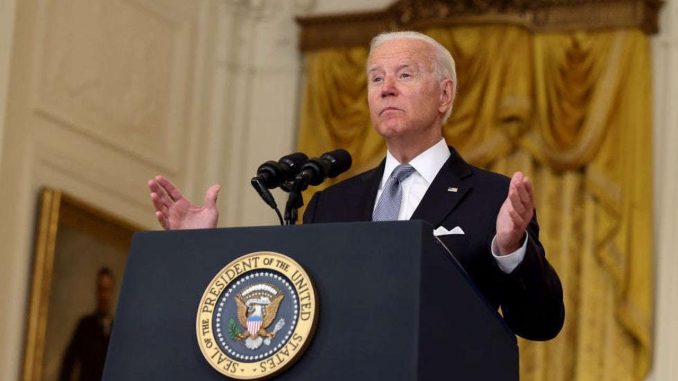
President Biden is enduring the worst week of his presidency, unable to tame the chaos in Afghanistan and facing frustration even from his Democratic allies.
The scenes from Kabul speak for themselves regarding the human cost of the U.S. withdrawal and the Taliban’s takeover.
In terms of U.S. domestic politics, one key question is whether the debacle is an inflection point, presaging difficult times ahead for the president — or whether it comes to be seen as a traumatic but brief bump in the road.
Biden’s honeymoon period, such as it was, was drifting to an end even absent the Afghanistan situation.
The early success of the COVID-19 vaccination rollout has given way to new concerns spurred by the delta variant. The nation is seeing around 140,000 new cases of COVID-19 infection each day, a level unseen since last winter’s peak.
The fate of Biden’s push on infrastructure is uncertain. Tensions between moderate and progressive Democrats call into question whether he will be able to pass his two separate infrastructure proposals — one costing around $1 trillion and the other around $3.5 trillion — into law, especially when his party has such narrow congressional majorities.
The economy had seemed like a bright spot for Biden — and could yet remain one — but concerns over inflation have not gone away.
Meanwhile, attempted illegal crossings of the southwestern border are near all-time highs. The issue has received limited mainstream media attention but is a huge story for more conservative-leaning voters.
All of those ingredients would make for a challenging environment for any president, even without the embarrassment of Afghanistan falling into chaos.
The scenes earlier this week of desperate Afghans clinging to an American military plane called to mind exactly the kind of “Saigon moment” that Biden had recently insisted would not occur.
Republicans, predictably, think the episode could fundamentally reshape the political standing of a president who has enjoyed solid public approval thus far.
“He has a short-term problem and a long-term problem,” said Matt Mackowiak, a GOP strategist and Republican Party chairman in Travis County, Texas.
“The short-term problem is that he has to address this crisis and it is getting worse by the minute. The long-term problem is that he has real challenges now in terms of convincing voters of his ability to make decisions,” he said.
Mackowiak added, “The Afghanistan crisis casts doubt on his ability to be an effective president of the United States, and that’s really sad.”
Even though Republicans have clear motivations to make such points, Biden has done himself no favors this week.
The crisis was well underway before he made a speech from the White House on Monday. Even then, the address faced criticism that Biden had sought to place the blame on others, including the Afghans themselves, in a speech that then had a boilerplate acknowledgment that “the buck stops with me” tagged on.
On Wednesday, excerpts from a forthcoming interview with George Stephanopoulos of ABC News showed Biden claiming that the “chaos” in Afghanistan could not have been avoided, and answering “yes” when asked if it had been “priced in” to his decision to withdraw U.S. forces.
In the brief clip, Biden appeared both defensive and tetchy — hardly an ideal combination when dealing with his first major foreign policy crisis.
Opinion polls are showing erosion in Biden’s standing. A Reuters/IPSOS poll conducted Monday indicated his approval rating was at the lowest point of his presidency, with just 46 percent of Americans backing his performance.
An Economist/YouGov poll conducted Aug. 14-17 showed the public evenly split on Biden, with 47 percent approving and 47 percent disapproving of how he is doing his job.
Still, a separate Reuters poll focused purely on Afghanistan buttressed some of Biden’s key arguments.
The poll, also conducted on Monday, found 61 percent of adults still favoring an on-schedule U.S. withdrawal. An even higher number, 68 percent, agreed with the sentiment that “the war in Afghanistan was going to end badly, no matter when the U.S. left.”
The hope in the White House will be that this underlying agreement with Biden’s position will ultimately prevail, especially as this week’s images fade from the headlines.
But even some Democrats express trepidation about how voters will judge the Afghanistan fiasco and whether it will have spillover effects in terms of the electorate’s general view of Biden.
“Most Americans believe we should have come out of Afghanistan a long time ago, so I don’t think the big issue is his decision to come out when he did,” said Democratic strategist Basil Smikle. “What voters are looking at is, can he make good decisions at moments of crisis, at moments when the lives of soldiers and American citizens abroad are on the line?”
Smikle added, “That is probably the only narrative of this moment that may extend into the midterms.”
Right now, Biden and his advisers would be happy to just alleviate the immediate crisis.
Only after that is accomplished will we really know how much political damage has been done.
Via The Hill


